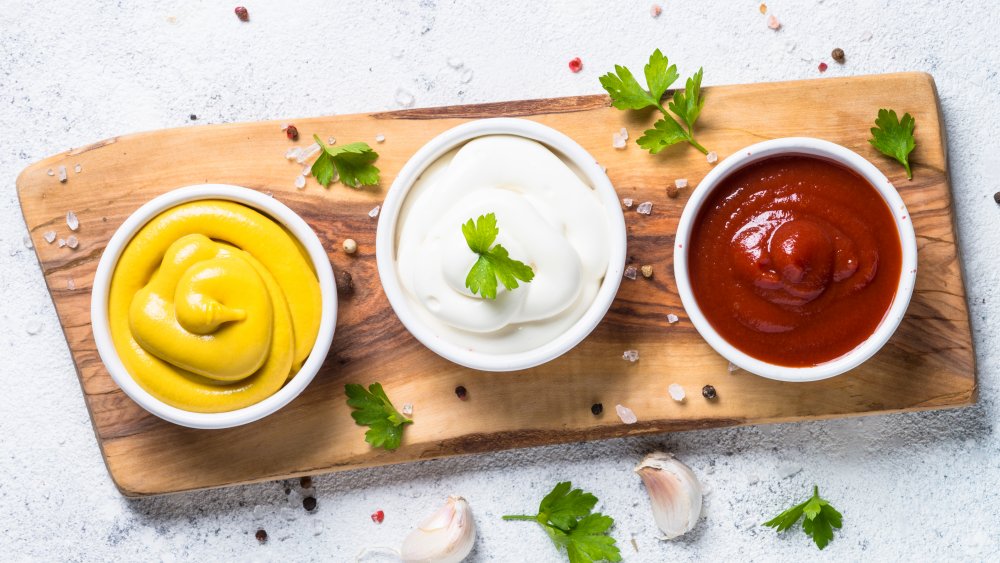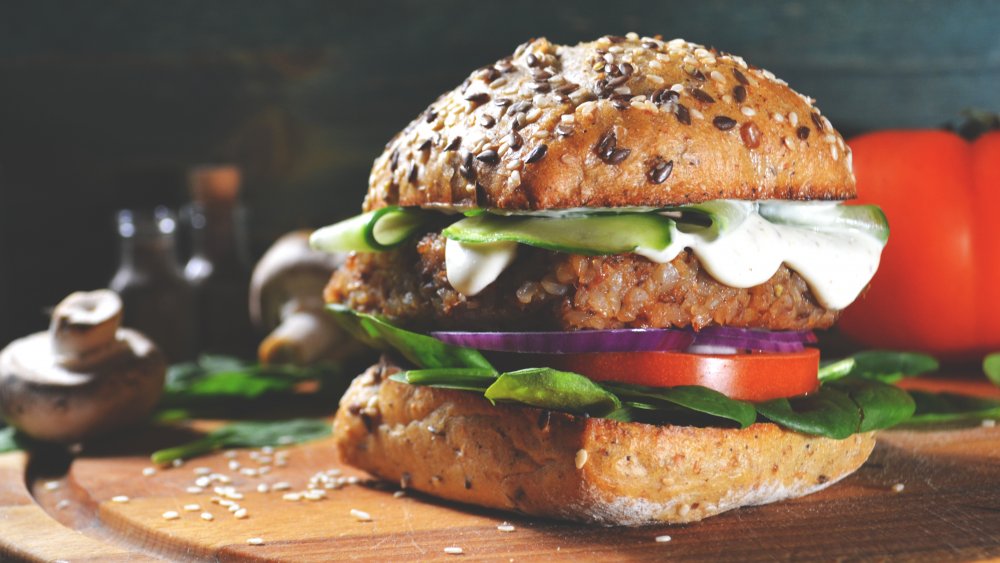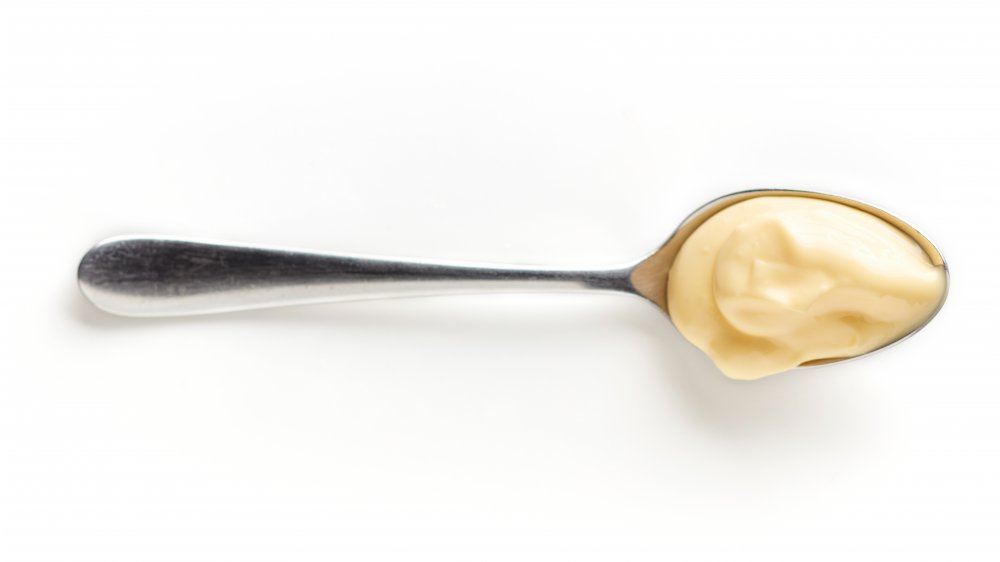When You Eat Mayonnaise Every Day, This Is What Happens To Your Body
Though some people may not eat mayonnaise every day, there are plenty of people who love it. While many people might assume that ketchup is the favorite condiment of the world, that isn't exactly the case, as mayonnaise has been proven to be even more beloved. Though you might not be able to imagine dipping your French fries in anything other than ketchup, mayonnaise still reigns supreme. The creamy, white substance is likely so popular because of the fact that it is used in many recipes like chicken salad, and can be used to make a lot of different dips.
According to Quartz, mayonnaise is technically the most popular condiment in America. "The US now consumes some $2 billion worth of mayonnaise each year," the publication reported, based on information from Euromonitor. Whether you use it as a dip or as the base for a delicious sauce, or you just smear it on your sandwich, mayonnaise is certainly a condiment that can be used in multiple ways. But as popular as it is, do you know how eating it could effect your health? Many assume that mayo is terrible for you, but it's not as black and white as that. So, what happens to your body if you eat mayonnaise every day? Well, a lot, as it turns out.
If you eat mayonnaise every day, you could raise your cholesterol
Now, while mayonnaise might be delicious, that doesn't mean it's nutritious. Part of what makes mayonnaise so controversial in the health and nutrition world is that it's pretty high in saturated fat, at least when you consider how small a serving of mayonnaise is.
As Livestrong reported using information from MyFoodData, a tablespoon of mayonnaise has about 1.6 grams of saturated fat. And while that might not sound like much, it's kind of a lot for such a small amount. And when you take into consideration that most people don't measure out mayonnaise when they use it, all that saturated fat could easily add up and have a negative impact on your cholesterol. Healthline noted, "One of the main reasons for recommending that saturated fat intake be kept to a minimum is the fact that saturated fat consumption may increase certain heart disease risk factors, including LDL (bad) cholesterol."
So, if you were to eat mayonnaise every day, especially if you don't take the serving size seriously, you might raise your cholesterol.
You could consume a lot of healthy fats if you eat mayonnaise every day
When you think about the fact that one of the main ingredients in mayonnaise is egg yolk, it's not surprising that the condiment is full of fat. But not all fat is created equal, and there are actually some health benefits to eating a diet rich in fat. As Livestrong reported, "Mayo contains omega-3 and omega-6 fatty acids, which are unsaturated fats."
And as it turns out, those unsaturated fats "can help lower cholesterol levels and reduce your risk of heart disease," according to WebMD. So, even though mayonnaise does have saturated fats, which can hurt you, it also has unsaturated fats, which are healthy. And, if you want to get the full health benefits of the fat in mayonnaise, you can always choose a healthier mayo option at the store. Mayonnaise that's made with avocado oil, for instance, tends to be lower in saturated fat, but still has all the perks of unsaturated fats. So if you want to eat mayonnaise every day, you definitely have options.
You could potentially reduce your risk of stroke if you eat mayonnaise every day
Mayonnaise has a lot more going for it than just the fat. Sure, it tastes good and is adaptable to just about any flavor you want to add to it, but mayonnaise is also pretty rich in a certain vitamin, which has a lot of health benefits in and of itself. Yes, as FreeFoodFacts reported, mayonnaise has several great vitamins in it, including vitamin E.
A study from the Ohio State University Center for Clinical and Translational Science found that there is a type of vitamin E "which appears to remodel the brain's circulatory system and provide protection the instant a stroke strikes," as reported by Science Daily. Vitamin E has a lot going for it, but the fact that it could prevent strokes is pretty extraordinary. And as mayonnaise has quite a bit of vitamin E in it per serving, if you eat mayonnaise every day, you could potentially help reduce your risk of a stroke.
If you eat mayonnaise every day, your body could absorb nutrients better
Mayonnaise goes great with just about everything, so it's totally understandable that you would want to eat it every day. Of course, if you do want some mayonnaise on a daily basis, you should at least keep track of how much you're eating because of the fats in mayo — moderation is key! But fats, in general, are beneficial for your body in one important aspect: Fats help your body absorb nutrients better.
The American Heart Association explained, "Fats help your body absorb some nutrients and produce important hormones, too. Your body definitely needs fat." When you eat fats, your body can really sponge up all the nutrients that you're consuming as well, which is so important. You can take all the vitamin C supplements, probiotics, or biotin gummies in the world, but if you aren't getting enough fat in your diet, your body isn't going to absorb them very well. So, if you eat mayonnaise every day, you could actually be helping your body become even stronger.
You could be consuming too many bad fats if you eat certain mayonnaise brands
Because mayonnaise is mostly made up of egg yolk and vinegar, you might be surprised to learn that a lot of mayonnaise brands have added oils in them that typically aren't of the best quality.
According to Verywell Fit, "In the United States, most commercial mayonnaise is made with soy oil, which some experts feel is problematic due to its high levels of omega-6 fats." Those omega-6 fats are polyunsaturated fatty acids, and, according to Healthline, Americans tend to get too many omega-6 fats in their diets as it is. Additionally, WebMD noted, "Too much omega 6 can raise your blood pressure, lead to blood clots that can cause heart attack and stroke, and cause your body to retain water." That said, if you eat mayonnaise every day, you are subjecting yourself to a lot more omega-6 fats than are necessary if you're already consuming enough omega-6 fats from other sources.
You could put yourself at risk for heart disease if you eat mayonnaise every day
Because of all the fat in mayonnaise, it can be easy to forget that mayo also contains a lot of sodium, which is definitely not good for you. Specifically, the sodium in mayonnaise could potentially lead to heart disease, along with a host of other health issues.
Fox News reported, "Mayonnaise will contain more than 100 milligrams of sodium per tablespoon," and, since most people don't measure out exactly one tablespoon when they put mayonnaise on a sandwich, it's likely you'll be consuming far too much sodium. Additionally, the American Heart Association noted that a diet high in sodium has the potential to "increase your risk for high blood pressure, stroke, and heart failure." Unfortunately, that's not all, as too much sodium can also cause your body to become more susceptible to headaches, kidney stones, an enlarged heart muscle, osteoporosis, and more, all of which make it obvious that a high-sodium diet has more pitfalls than the deliciousness is worth.
You won't get a lot of nutrients by choosing to eat mayonnaise every day
Mayonnaise is clearly an interesting condiment, and one that has the potential for complicated side effects. But for all the fat that mayonnaise contains, as well as all the flavor and creaminess that makes it so special, it doesn't contain a whole lot of nutrients. In fact, it hardly contains any nutrients at all.
Livestrong reported, "Mayo is typically not nutrient-rich, although a tablespoon does have 19 percent of the daily value (DV) for vitamin K." A serving of mayonnaise "also has trace amounts (between 1 and 4 percent) of selenium, vitamin B12, choline, lutein and zeaxanthin." So, other than vitamin K, mayonnaise doesn't have many vitamins or minerals in it to boost its health offerings. Of course, that doesn't mean you shouldn't eat it, but, if you do eat mayonnaise every day, you can't rely on it for the proper nutrition your body needs. You will, of course, need to eat a balanced diet to stay in tip-top shape, so don't just turn to mayo when you want to add a little flavor to your meal.
When you eat mayonnaise every day, you could experience inflammation
There are a dozen or more different mayonnaise brands out there, all offering different versions of the condiment. Unfortunately, mayonnaise products that are made with a certain kind of oil can lead to inflammation.
According to Thrillist, when mayonnaise is mass produced, manufacturers tend to use either vegetable oils or soybean oils, "which are very likely coming from genetically modified ingredients." And those soybean oils are super high in omega-6, which can have negative side effects. As Healthline reported, "Scientists have hypothesized that too much omega-6 relative to omega-3 may contribute to chronic inflammation," which comes with its own host of issues, too. Specifically, chronic inflammation could potentially lead to serious diseases and illnesses like cancer, arthritis, heart disease, and diabetes.
Fortunately, for all the mayo-lovers out there, there are plenty of healthier options to choose from, and you could always try to make your own if you want to eat mayonnaise every day.
You could gain weight if you eat mayonnaise every day
If you eat too much of anything, it could lead to weight gain — even if you eat too many healthy foods. Moderation is key, but, with mayonnaise, it can be hard to really watch how much you're consuming.
According to Thrillist, just one tablespoon of mayonnaise has around 90 calories and and about 10 grams of fat, and all that adds up. Because of that, people who eat mayonnaise every day might be consuming hundreds of calories without really knowing it. Additionally, the soybean oil in store-bought mayonnaise has been shown to lead to obesity, as well as other diseases. A 2012 study from the Alimentary Pharmabiotic Centre at the Biosciences Institute in Ireland found that "high dietary omega-6 polyunsaturated fatty acids" can lead to obesity, among other health troubles.
So if you eat mayonnaise every day, especially if you aren't watching how much you're eating, you might gain some unwanted weight.
If you eat mayonnaise every day, it could have an effect on your brain
Many of the mayonnaise products that you buy from the store are full of artificial ingredients and preservatives. Additionally, the soybean oil in a lot of mayonnaises could actually have quite a negative impact on your brain.
A study by University of California (UC) Riverside that was published in Endocrinology in February 2020 discovered a link between soybean oil consumption and brain function, and, well, it wasn't positive. As Being Patient reported of the study, there were two types of soybean oil that were researched, and both effected the brain the same way. "That was mostly seen as a change in the hypothalamus, a brain region that's associated with a number of functions like body weight, metabolism, body temperature, reproduction and stress response," Being Patient explained. Therefore, if you eat mayonnaise every day, you might actually notice changes in the rest of your body that are the results of changes in your brain, and most of them aren't good.
Your body will receive more of this antioxidant if you eat mayonnaise every day
Most people associate mayonnaise with negative side effects, considering all the fats in mayo. But the delicious condiment might actually provide more benefits than you'd probably assume because a lot of those fats and oils can be good.
Livestrong reported, "Most mayonnaises are made with soybean oil, which is rich in polyunsaturated fats." Those polyunsaturated fats aren't the best for your health, but they do actually have some benefits. According to the American Heart Association, polyunsaturated fats can actually be good for you, as long as you're watching how much you're eating. Additionally, oils that have a lot of polyunsaturated fats in them are also high in vitamin E, "an antioxidant vitamin most Americans need more of."
Of course, eating a lot of mayonnaise every day won't be good for you, and soybean oil does have negative side effects as well, but since it contains the antioxidant vitamin E, eating a little bit every day could be a good idea.
You might experience MSG symptom complex if you eat mayonnaise every day
Because store-bought mayonnaise is made to keep for a while, it has a lot of additives that you don't necessarily need. As SFGate reported, mass-produced mayonnaise and most store-bought mayonnaise brands tend to be full of artificial ingredients like additives, preservatives, and, of course, monosodium glutamate, otherwise known as MSG. MSG probably sounds familiar, as it gets demonized quite a bit by the health food industry. And as it turns out, though "generally recognized as safe," MSG might be even more deserving of its bad reputation than you think.
According to Mayo Clinic, the Food and Drug Administration has actually noticed that a lot of people have reported having bad reactions to foods with MSG in them — so much so that the FDA kept track and began labeling those reactions as MSG symptom complex. Symptoms include "headache; flushing; sweating; facial pressure or tightness; numbness, tingling or burning in the face, neck and other areas; rapid, fluttering heartbeats (heart palpitations); chest pain; nausea;" and "weakness," per Mayo Clinic.
So if you want to prevent any chance of experiencing these potential MSG side effects, none of which sound pleasant, you might not want to eat mayonnaise every day... or at all.
You could increase your added sugar intake if you eat mayonnaise every day
Believe it or not, but that jar of mayonnaise you bought from the store probably has added sugar in it. According to SFGate, regular mayonnaise contains about one gram of sugar per tablespoon. However, mayonnaise that claims to be low-fat may indeed be low-fat but also tends to have more added sugar, usually more than four grams of sugar per tablespoon. Either way, the added sugar in mayonnaise definitely isn't good for you.
The Centers for Disease Control and Prevention actually warn Americans about added sugars. "Americans are eating and drinking too much added sugars which can lead to health problems such as weight gain and obesity, type 2 diabetes, and heart disease," per the CDC website. The CDC also recommends that Americans should probably monitor their consumption of added sugars, and make sure that it makes up less than 10 percent of the number of calories they consume per day.
So, if you eat mayonnaise every day, especially low-fat mayo, you're probably consuming too much added sugar.
Want to make a positive change? Eat mayonnaise made with olive oil
Because Americans are becoming more health-conscious than ever before, there are a ton of healthier, more natural alternatives to many products people consume on a daily basis. There are gluten-free pastas, sugar-free barbecue sauces, and so much more. So, of course, there are healthier mayonnaise options as well. One such alternative could be a mayonnaise made with olive oil instead of soybean oil. Olive oil is a great fat source to begin with, but it has a ton of other health benefits as well.
According to Healthline, olive oil — specifically extra virgin olive oil — "may be the healthiest fat on the planet." Olive oil has antibacterial properties, is full of antioxidants, can reduce your risk for diabetes, promotes a healthy weight, may prevent heart disease and strokes, and is anti-inflammatory. Depending on the amount of olive oil present in your mayo, you could experience some of these benefits.
However, it's worth noting that people shouldn't consume more than their overall daily fat intake when it comes to olive oil, according to Healthline. So while mayonnaise with olive oil could be a healthy replacement to regular mayonnaise, like most foods, it should be eaten in moderation.














